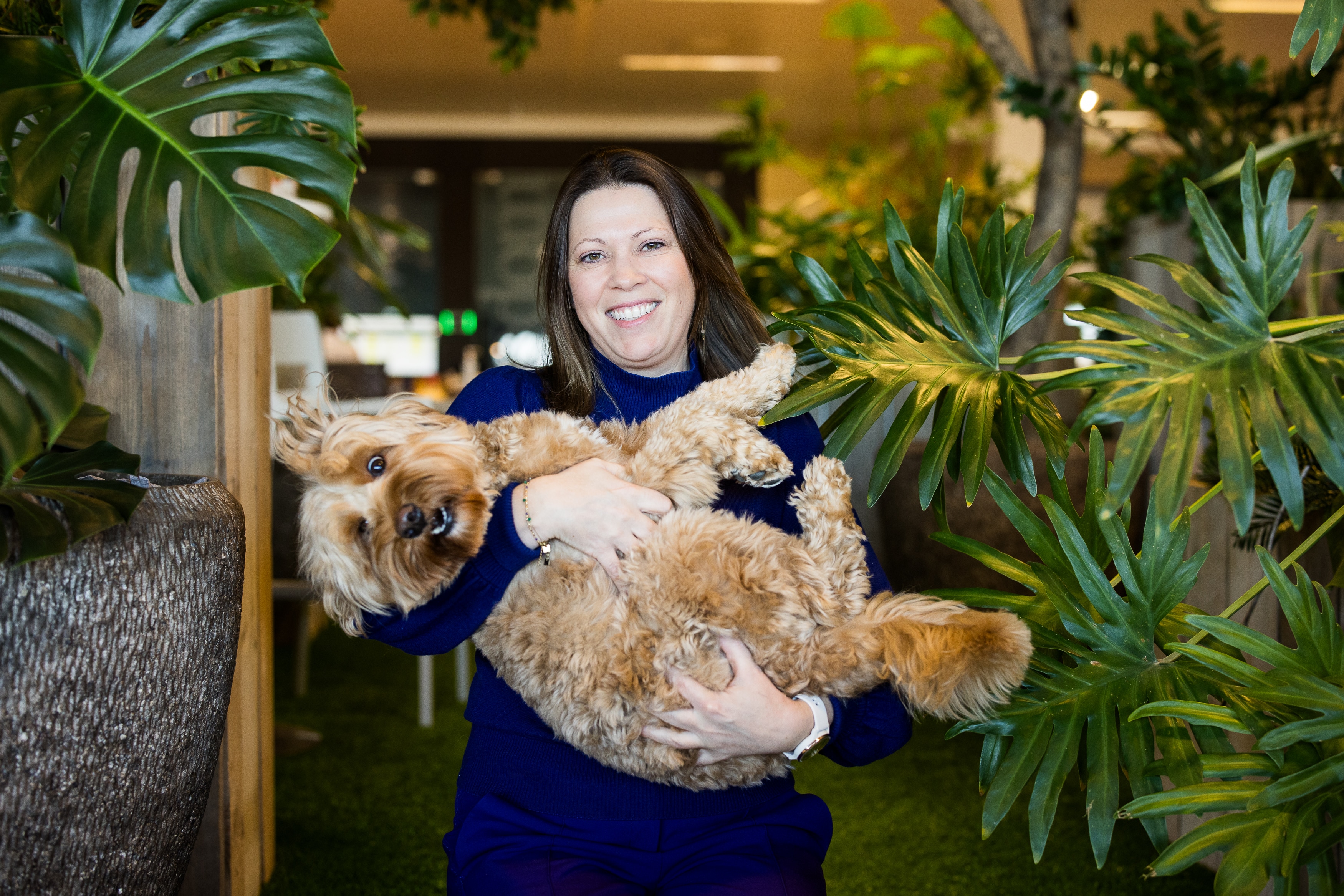Mars Belgium: 6 out of 10 Belgian office workers are less stressed when dogs are present in the office
The dog in the workplace is much more than just a cuddly colleague
Read this story in French: 6 employés de bureau belges sur 10 sont moins stressés par la présence d'un chien au bureau(Opens a new window)
Read this story in Dutch: 6 op de 10 Belgische kantoorwerkers ervaren minder stress met hond op kantoor(Opens a new window)
- No less than 4 out of 5 Belgians working in the office experience regular stress.
- Almost 3 out of 10 of them almost never take breaks during working hours.
- 7 out of 10 Belgians who have a dog in the office say that it reduces their overall stress level and 6 out of 10 feel less personal stress.
- 7 out of 10 owners who bring their dog to the office take breaks more often and feel more productive afterward.
- For more than one in 5 Belgians, a dog-friendly working environment is a reason to come to the office more often.
- For 39% of office workers, a dog-friendly working environment influences their choice of job and for 12% of them, this aspect is even decisive.
On the occasion of the Take Your Dog to Work Day (TYDTWD), Mars Belgium and iVOX today announce the results of their new study1 on the impact of dogs in the workplace. As it turns out, there are more than enough reasons to encourage employees to bring their dogs to the office. For example, having a four-legged friend in the office not only reduces stress levels, but also improves the quality of breaks and productivity. In addition, for many owners, a dog-friendly office is a motivation to come to the office more often and an important factor in their choice of job. For maximum added value, it is essential to have a well-thought-out policy in place with clear guidelines.
Office work as a source of stress
The trend of working from home seems to be easing, as many companies are once again expecting their employees to come to the office more often. The latest survey by Mars Belgium and iVOX shows that more than 3 out of 4 Belgians working in the office spend most of the week there, with 43% even working there 5 days a week. Although this situation has advantages such as a close relationship with colleagues (92%), job satisfaction (82%) and productivity (79%), 4 out of 5 Belgians who work in the office experience stress on a regular basis. Travel time (42%), noise (36%), interruptions (31%), work-life balance (27%) and overwork (27%) all increase the stress of office work. And for pet owners, the stress of leaving their pet alone at home (10%) adds to this pressure.
Dogs in the office: less stress and more and more pleasant breaks
The solution? The presence of cheerful four-legged friends in the workplace. The majority of Belgian office workers are convinced that this presence has a positive impact on various aspects such as stress (69%), interaction with colleagues (61%), atmosphere (61%), well-being (60%) and happiness at work (59%). Young workers (18 – 34 years old) and those who already work in a dog-friendly office are particularly convinced of this added value. Seven out of ten office workers who work with dogs also say that it has reduced their overall stress levels and 6 out of 10 feel less personal stress.
“Dogs in an office environment can indeed have a positive impact in certain circumstances, both for dog owners and for people who do not have a dog themselves,” say Dr. Joni Delanoeije, researcher at KU Leuven in the field of human-animal relations, and Joke Decru, director of AAP vzw, both of which specialise in supporting businesses with regard to dogs at work (Kantoorhonden.be). "The bond between humans and dogs is unique and can contribute to our mental and physical well-being in a variety of ways, reducing our stress levels. Dogs distract us and allow us to take our minds off things for a while. However, it is important to know that a dog does not always thrive in a work environment, and not all employees thrive with a dog in the office. It is therefore essential that implementation is done with full knowledge of the facts."
These cuddly colleagues also seem to have a positive influence on the frequency and quality of breaks. And that's not a luxury, because almost 3 out of 10 office workers hardly ever take breaks during their working hours. And yet, according to respondents, these breaks in the office reduce their stress levels (70%) and increase their productivity (74%). Less than 3 out of 5 office workers take quality breaks and only a third of them go out regularly. Dogs seem to counteract this negative trend. In fact, 7 out of 10 owners who are allowed to bring their dog to the office and take breaks report taking breaks more frequently and feeling more productive afterward. For 8 out of 10 of them, these breaks are also of better quality.
Sound policy for maximum added value for employees and employers
Dogs are welcome in 16% of Belgian offices, a significant increase from 6% in 2019, although this represents a slight decrease from 21% in 2023.
The survey also reveals significant benefits for employers. For more than one in five office workers, a dog-friendly work environment would be a motivation to come to the office more often. In addition, as many as 48% of employees already working in such an environment say they visit the office more frequently as a result of the policy. In addition, for 39% of respondents, a dog-friendly office influences their choice of job, and for 12% of them, this aspect is even decisive.
More than half of dog owners who don't yet work in a dog-friendly office would take their dog with them if they were allowed to. Among office workers aged 18 to 25, also known as Generation Z, this figure rises to 71%! Of the owners who work in a dog-friendly work environment, almost half take their dog with them every week, and 40% do so most of the time. They claim that dog-free areas for colleagues who prefer it, regular breaks, and amenities such as food and water bowls, cushions, and toys would make it much easier to choose to take their four-legged friend. To ensure that people who do not own a dog also feel comfortable in the office, Belgian office workers agree that it is important to create dog-free zones, establish clear guidelines and carry out regular cleaning.
"Proper implementation and a clear policy that also takes into account the well-being of the dogs themselves and employees who do not always appreciate the presence of a four-legged friend are crucial. This is how we can prevent problems and make the most of the potential - for both humans and animals - of dogs in the workplace," confirm Dr. Joni Delanoeije and Joke Decru. "Compared to the pre-Corona period, the number of dog-friendly offices in Belgium seems to have increased significantly. The fact that we are seeing a slight decline this year could have several reasons. It is possible that Belgian companies will need an extra boost to develop initiatives regarding dogs in the workplace. »
Open-mindedness: a guarantee of success
At Mars, Mars Petcare's parent company, the "Take Your Dog To Work Day" has been held every day for two decades. The company is committed to animal welfare and dog-friendly offices and sets an example itself. To encourage employees to bring their dogs, Mars is creating a pet-friendly atmosphere in the office, with dog-friendly meeting rooms, walking routes, and dog-friendly rest and play areas. This approach improves work-life balance, the work atmosphere, collegial relationships and team spirit. Employees also receive benefits such as "Paw-ternity Leave," which allows them to receive 10 hours of paid time off at select subsidiaries to help their pet get used to a new home.
An De Volder - General Manager Mars Multisales
« As a pioneer of pet-friendly offices in Belgium, we are pleased that this study confirms the positive impact of dogs on the working environment ," says An De Volder, General Manager of Mars Multisales Belgium. "As part of our mission 'A Better World for Pets', we aspire to a society where pets are increasingly welcome. We conducted this study in several countries and, by comparing the results, we find that Belgian employers are slower to adopt dog-friendly policies. And that's a shame, because what is there to lose? We are often afraid of the unknown. With our years of experience and expertise, we want to support other Belgian companies with advice and assistance, encouraging them to consider a "dogs in the office" policy with an open mind, rather than focusing on possible obstacles. The added value of this policy is enormous and essential in the "war for talent", provided that a clear policy is put in place to make it work for everyone.”
To inspire other companies to adopt a pets@work program and show how successful it can be, Mars regularly opens its doors to other organizations. Mars Belgium also collaborates with research institutes like KU Leuven and organisations like AAP vzw and Kantoorhonden.be to study the positive impact of animals on people – and people on animals – and apply it to the workplace. Mars is therefore happy to share tips and insights from research and its own experience.
1 Online survey conducted by the research firm iVOX on behalf of Mars between 4 and 7 May 2024 among 1,000 active Belgians (in the office or hybrid) and students who plan to start working in an office within 1 to 2 years, representative by region, gender, age and level of education. The maximum margin of error in this group of 1,000 Belgians is 3.02%.
EXTRA: Five Key Tips for a Dog-Friendly Setting in the Office
START OFF ON THE RIGHT FOOT... UH, ON THE RIGHT PAW
Tip 1: Create a pet-friendly policy that aligns with your corporate culture and the company's strategic choices. For example, in the context of improving the health and well-being of employees.
Tip 2: Set rules for four-legged friends, but also for bipeds! Make them official, explicit and written. Take a cue from Mars, where every employee must sign house rules before their loyal four-legged friend is welcome in the office.
Tip 3: Introduce a "pet ambassador" and empower them. This person will ensure that the rules are followed, tell the owners what steps to take, and act as a mediator if necessary.
Tip 4: Take it one step at a time: start small, for example by participating in the international "Take your dog to work day", and then expand the initiative more broadly. The same goes for dogs. Mars recommends introducing them gradually in the office: first for a few hours, then half a day and finally whole days. In this way, the dog, its owner, other dogs and their owners, as well as colleagues, can get used to office life quietly.
Tip 5: Provide appropriate "infrastructure": for example, provide a cleaning kit in case of an "accident", a space for dogs to go outside and play, and clear signage.

















